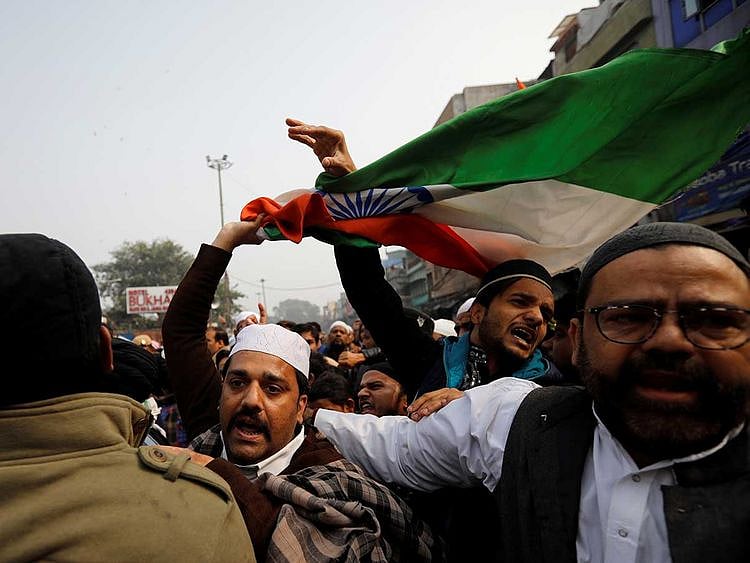India citizenship law protest: Massive anti-CAA protest at Delhi's Jama Masjid
Police banned public gatherings in parts of New Delhi and other cities for a third day

New Delhi: As Friday prayers ended, a massive protest started from the Jama Masjid here in the old city with Bhim Army chief Chandra Shekhar 'Azad' leading the chants of "Jai Bhim" and holding placards with Babasaheb Ambedkar's posters, demanding that only the original Constitution be enforced.
The protests were in continuation of those taking place across the nation against the just enacted Citizenship (Amendment) Act and the National Resgister of Cirtizens (NRC).
Police banned public gatherings in parts of New Delhi and other cities for a third day Friday and cut internet services to try to stop growing protests that have so far left eight people dead and more than 1,200 others detained.
The protests have targeted a new citizenship law that opponents say threatens the secular nature of Indian democracy in favor of a Hindu state.
Demonstrations are planned around India as opposition to a new law that provides a path to citizenship has quickly expanded from predominantly Muslim universities and communities to a much wider section of the Indian public.
Demanding withdrawal of the CAA the protestors in Delhi held up copies of the Constitution and pictures of Dr Bhimrao Ambedkar and Paramveer Chakra awardee Abdul Hameed.
The crowd swelled despite a prohibitory order in place, even a few women protester could be seen.
With the national flag held high the protestor shouted: "Hindustan Zindabad".
While some see the law as a slight against Muslims, others, including Hindu conservatives in Prime Minister Narendra Modi's own Bharatiya Janata Party, fear it will encourage immigration to India, where public services for its 1.3 billion people are already highly strained.
"In effect, some of the BJP's own rank and file, the very people the party has sought to help, have come out against the law,'' said Michael Kugelman, deputy director of the Asia Program at the US-based Wilson Center.
Kugelman said that the government's failure to respond to the protests, except to accuse political opponents of orchestrating them, is "likely to galvanize the protesters even more.''
A law banning the assembly of more than four people was imposed for a third day in parts of the Indian capital as well as in several cities in northeastern Assam state and the northern state of Uttar Pradesh, where a motorized rickshaw driver was killed during a protest in the capital Lucknow.
Authorities erected roadblocks and turned areas around mosques in New Delhi, Lucknow and other Muslim-dominated areas into security fortresses to prevent widespread demonstrations after Friday prayers.
Police temporarily held 1,200 protesters in New Delhi alone on Thursday and hundreds of others were detained in other cities after they defied bans on assembly. Most protesters were released later in the day.
On Friday, New Delhi police rejected a permit application for a group representing Dalits, the lowest rung in in India's caste hierarchy, to march from a mosque in Old Delhi to an 18th-century observatory where protesters have met every day since the law's passage last week near India's Parliament. The legislation has sparked anger at what many see as the government's push to bring India closer to a Hindu state. Critics say it's the latest effort by Modi's Hindu nationalist-led government to marginalize India's 200 million Muslims, and a violation of the country's secular constitution.
Modi has defended it as a humanitarian gesture.
Sign up for the Daily Briefing
Get the latest news and updates straight to your inbox
Network Links
GN StoreDownload our app
© Al Nisr Publishing LLC 2026. All rights reserved.